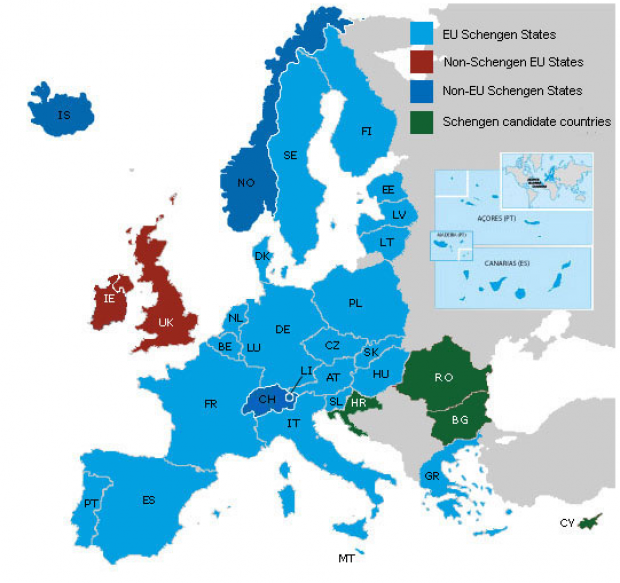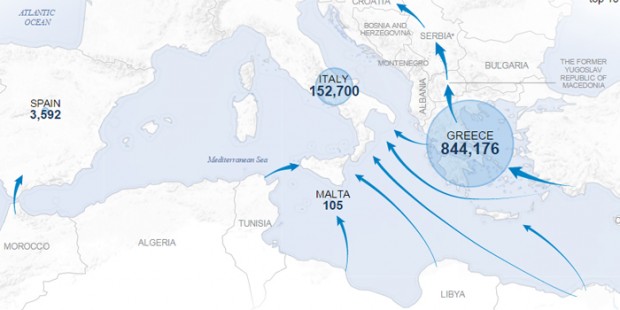The European Union gave Greece a 90-day waiting period Friday to find a way to control its borders, or be subject to the possibility of getting stuck with millions of refugees.
If Greece fails to satisfy the demands set by the EU, the Schengen agreement for free movement will effectively be suspended for two years — meaning Greece may be forced to take the vast majority of Syrian refugees coming to Europe. As more and more countries decide to deport refugees back to Greece, in accordance with the Dublin Regulation, Greece may see a population increase of more than 10 percent. (RELATED: What You Need To Know About The Greek Deal)
The Greek tragedy has been a headache for the European Union since the Euro crisis emerged in 2009.
Greece barely had time to celebrate a multi-billion dollar bailout package to save the country from economic collapse last July, when more than 840,000 refugees came knocking on its door in August. While Europe did everything it could to keep Greece from bankruptcy, it is showing no signs of saving them from massive refugee streams.
The decision Friday states that Greece has one month to “establish an action plan to remedy the deficiencies … [and] within three months of the same date, it shall report on the implementation.”
If Greece fails to do this, 26 European countries can close their borders for two years. This would be devastating news for Greece as 80 percent of the more than one million refugees that came to Europe last year used Greece as their point of entry before heading north.
Macedonia also closed its border to Greece last week, which shut down the so-called “Balkan route” that connects Greece with the rest of Schengen. Refugees that currently enter Greece are therefore stuck.

The Schengen Zone (European Union)
Greece’s inability to protect its own borders has not been much of an issue for the country itself during the fall, as most refugees have simply used the EU’s free movement arrangement to leap frog for countries that offer better conditions.
“Greece is like Afghanistan, there is nothing here for us refugees,” a refugee stuck at the Macedonian border told Der Spiegel Tuesday.
The influx has actually been a positive boost for Greece economically, with refugees pouring money into the struggling economy during their brief pit stop in the country. (RELATED: Refugees Are Causing A Mini Economic Miracle In Greece)
What makes it all backfire for Greece in the end is The Dublin Regulation. It was set up to put pressure on the countries that make up the external border of the European Union, and states that countries should send people that are rejected asylum back to the nation where they first entered the EU. For about 840,000 of the 1.1 million refugees that came to Europe last year, the regulation means going straight back Greece.
Sweden and Austria have already announced their plans to send back significant numbers of migrants to Greece, and other countries are expected to follow. (RELATED: Sweden Set To Deport 80,000 Refugees To Other EU Countries)

Graphic showing the point of entry for Syrian refugees in 2015. (UNHCR)
Adding to Greece’s misery are threats from Turkish President Recep Tayyip Erdogan to flood Europe with “millions of refugees” if the EU does not do more to help.
“Sorry, we will open the doors and say ‘goodbye’ to the refugees,” Erdogan said Wednesday.
If Erdogan stands by his threat, the open “doors” would lead directly to Greece, as it is the only Schengen country that shares a border with Turkey. With the Balkan route closed — and the possibility of the Schengen agreement getting suspended — the refugees would be for Greece to deal with on their own.
All content created by the Daily Caller News Foundation, an independent and nonpartisan newswire service, is available without charge to any legitimate news publisher that can provide a large audience. All republished articles must include our logo, our reporter’s byline and their DCNF affiliation. For any questions about our guidelines or partnering with us, please contact licensing@dailycallernewsfoundation.org.


